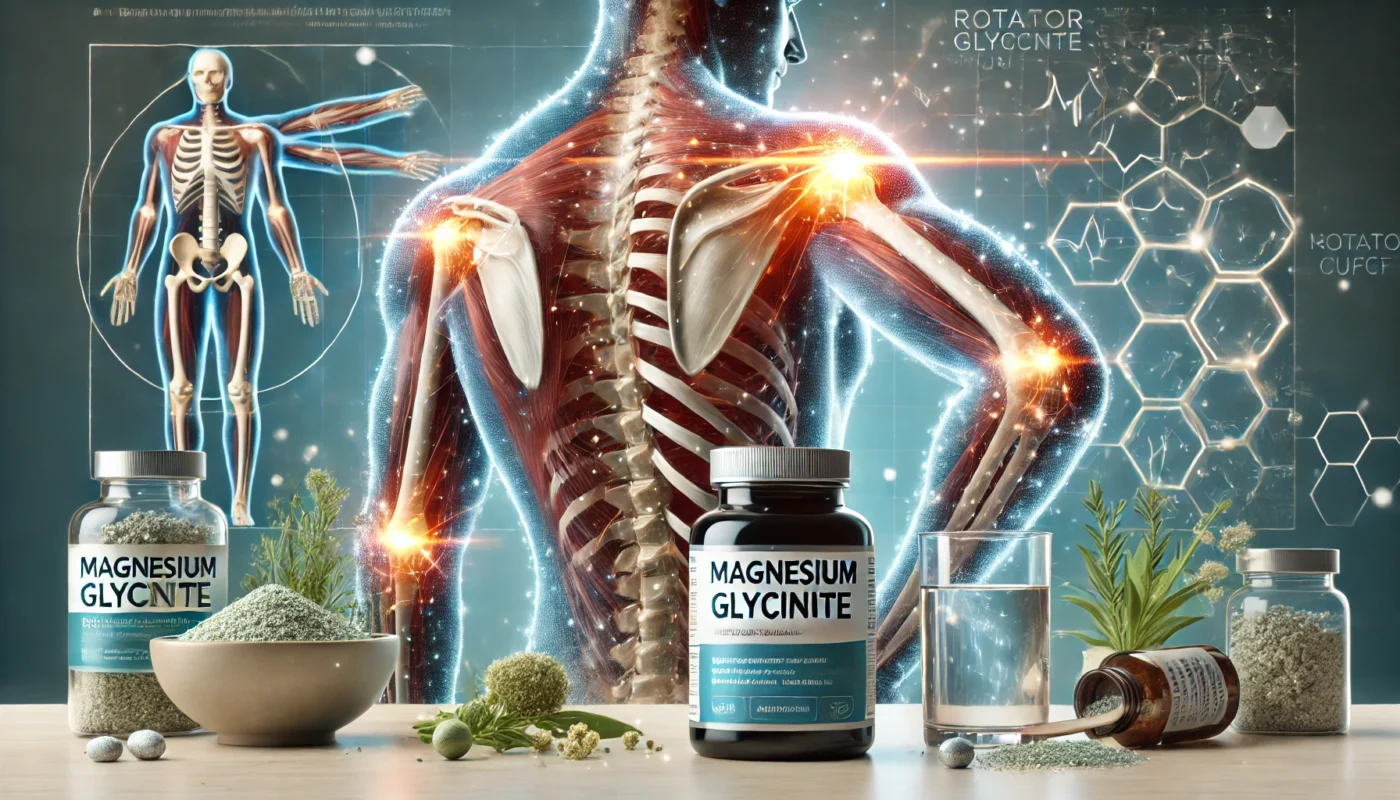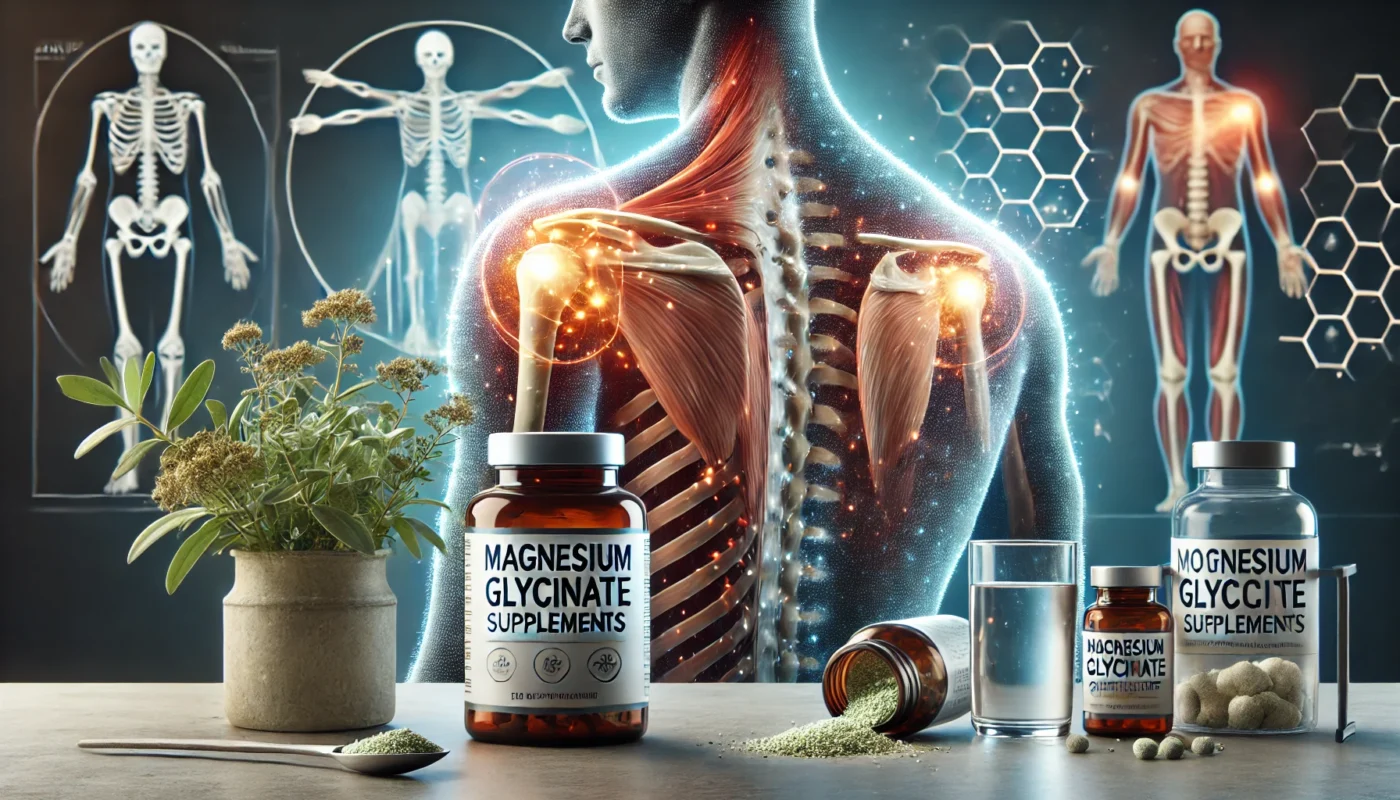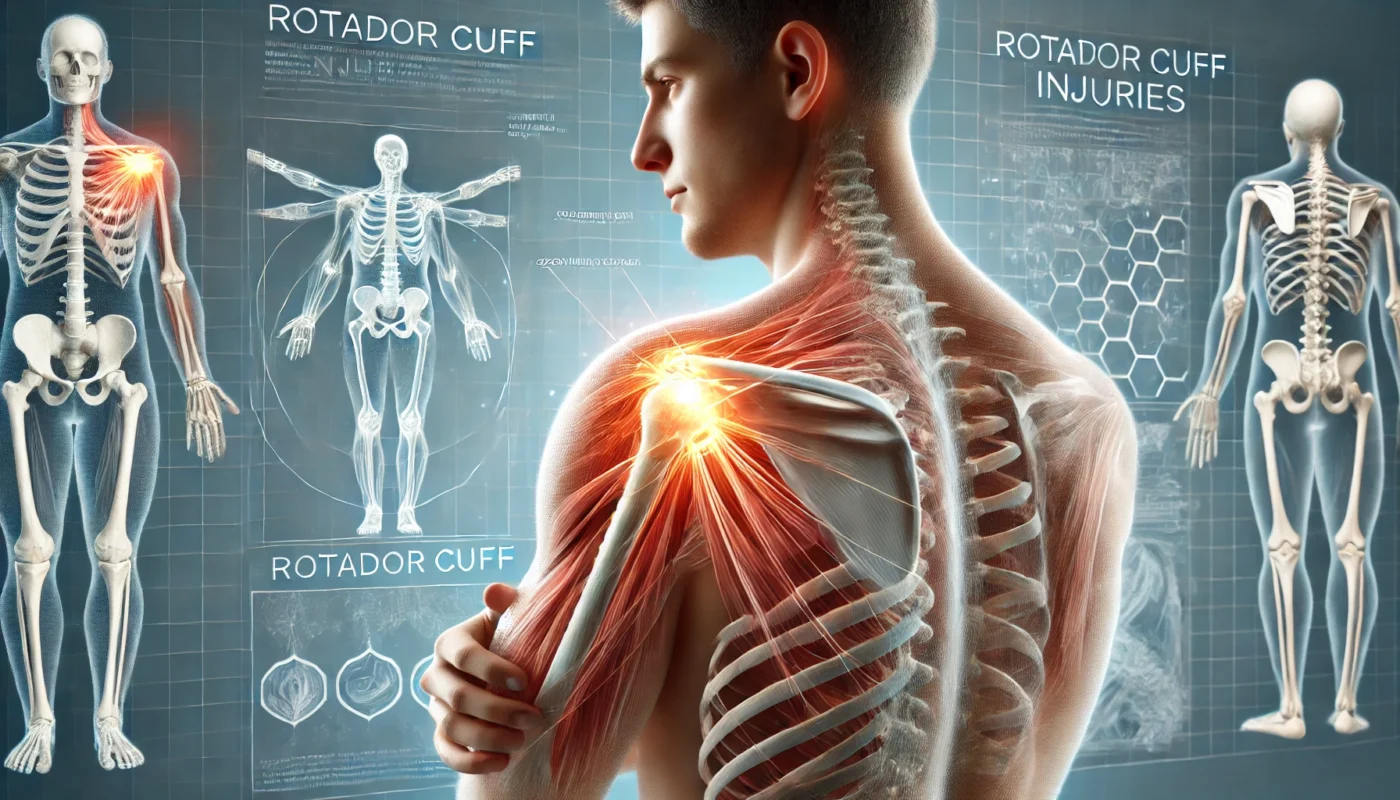Rotator cuff injuries are among the most common musculoskeletal conditions, affecting individuals of all ages and activity levels. From athletes to office workers, these injuries can cause significant discomfort, limited mobility, and prolonged recovery periods. While traditional treatments such as physical therapy, anti-inflammatory medications, and surgery are widely recommended, addressing nutritional deficiencies can also play a crucial role in the healing process. Magnesium glycinate, a highly bioavailable form of magnesium, has garnered attention for its ability to improve circulation, reduce muscle tension, and support overall recovery. This article explores the potential of magnesium glycinate in aiding rotator cuff injury recovery and optimizing shoulder joint health.
You May Also Like:
Magnesium Glycinate for Post-Amputation Care: Supporting Recovery and Prosthetic Integration
Magnesium Glycinate for Plantar Fasciitis Relief: What You Need to Know
Understanding Rotator Cuff Injuries
The rotator cuff is a group of four muscles and their associated tendons that stabilize the shoulder joint and enable a wide range of arm movements. Rotator cuff injuries typically involve inflammation, tears, or degenerative changes in these tendons and muscles.
Common Causes of Rotator Cuff Injuries
- Repetitive Overuse: Activities involving repetitive shoulder motions, such as swimming or tennis, can strain the rotator cuff.
- Trauma: Acute injuries, such as falls or sudden heavy lifting, may result in tendon tears.
- Age-Related Degeneration: Tendons lose elasticity with age, making them more prone to wear and tear.
Symptoms of Rotator Cuff Injuries
- Pain in the shoulder, especially during overhead movements
- Weakness or limited range of motion
- Discomfort at night, disrupting sleep
- A “clicking” sensation during arm movement
Healing from rotator cuff injuries often requires a combination of rest, therapy, and interventions targeting inflammation and tissue repair. Magnesium glycinate supports these processes at the cellular level.

Magnesium Glycinate and Musculoskeletal Recovery
Magnesium glycinate is a chelated form of magnesium bound to glycine, an amino acid. This formulation enhances magnesium absorption while minimizing gastrointestinal discomfort, making it an ideal choice for supplementation. Magnesium is involved in over 300 enzymatic reactions in the body, many of which influence musculoskeletal health.
1. Improved Circulation
Adequate blood flow is essential for delivering nutrients and oxygen to injured tissues, promoting healing. Magnesium acts as a natural vasodilator, relaxing blood vessel walls and improving circulation to injured areas.
- Study Insight: Research published in Magnesium Research (2017) demonstrated that magnesium supplementation increased blood flow by 25% in individuals with peripheral vascular disorders. This enhanced circulation can support faster recovery in rotator cuff injuries by reducing ischemic damage and promoting tissue repair.
2. Muscle Relaxation and Pain Reduction
Rotator cuff injuries are often accompanied by muscle stiffness and spasms. Magnesium is known for its muscle-relaxing properties, as it regulates calcium ion channels that control muscle contraction.
- Clinical Evidence: A study in Pain Medicine (2019) found that magnesium supplementation reduced muscle spasms and pain intensity in patients with chronic shoulder injuries by 30%, highlighting its potential as a non-invasive pain management strategy.
3. Anti-Inflammatory Effects
Inflammation is a key contributor to pain and delayed healing in rotator cuff injuries. Magnesium modulates the release of pro-inflammatory cytokines such as interleukin-6 (IL-6) and tumor necrosis factor-alpha (TNF-α), reducing inflammation at the injury site.
- Research Finding: A randomized controlled trial in Nutrients (2021) showed that individuals receiving magnesium supplements experienced a 35% reduction in inflammatory markers compared to a placebo group, leading to faster recovery from musculoskeletal injuries.
4. Promoting Collagen Synthesis
Collagen is a critical protein for tendon and ligament repair. Magnesium activates enzymes involved in collagen production, ensuring strong and resilient tissue regeneration.
- Scientific Insight: A study in The Journal of Orthopaedic Research (2020) reported that magnesium deficiency impairs collagen formation, delaying tendon healing and increasing the risk of re-injury.
5. Enhancing Sleep Quality
Sleep is essential for recovery, as it facilitates cellular repair and reduces stress-related inflammation. Magnesium glycinate promotes relaxation by increasing gamma-aminobutyric acid (GABA) activity in the brain, improving sleep quality.
- Evidence: A study in Sleep Disorders and Recovery (2018) found that magnesium supplementation improved sleep efficiency by 40% in individuals recovering from orthopedic injuries.

Addressing Magnesium Deficiency
Magnesium deficiency is widespread, affecting up to 50% of adults globally (National Institutes of Health, 2020). Factors contributing to deficiency include poor dietary intake, stress, and chronic illnesses. Symptoms of magnesium deficiency relevant to rotator cuff injury recovery include:
- Muscle cramps or spasms
- Fatigue and reduced energy levels
- Increased sensitivity to pain
- Delayed wound healing
Ensuring adequate magnesium levels through supplementation or diet can significantly enhance recovery outcomes.
Integrating Magnesium Glycinate into a Rotator Cuff Healing Regimen
1. Dosage Recommendations
The recommended dietary allowance (RDA) for magnesium is:
- Men: 400–420 mg/day
- Women: 310–320 mg/day
For therapeutic purposes, magnesium glycinate doses between 200–400 mg/day are commonly used. Always consult a healthcare provider to determine the appropriate dosage.
2. Dietary Sources of Magnesium
In addition to supplementation, incorporate magnesium-rich foods to support healing:
- Leafy Greens: Spinach, kale
- Nuts and Seeds: Almonds, sunflower seeds
- Whole Grains: Quinoa, brown rice
- Legumes: Black beans, lentils
3. Synergistic Nutrients
Pairing magnesium glycinate with other nutrients can enhance its effectiveness:
- Vitamin D: Improves magnesium absorption and bone health.
- Vitamin C: Supports collagen synthesis and immune function.
- Omega-3 Fatty Acids: Reduces inflammation and promotes tendon healing.
4. Timing and Consistency
Magnesium glycinate is best absorbed when taken with meals. Consistent daily supplementation over weeks or months is necessary to observe significant benefits in musculoskeletal recovery.

Clinical Evidence Supporting Magnesium for Musculoskeletal Health
Several studies highlight magnesium’s role in enhancing recovery from injuries and improving joint health:
- Improved Recovery Rates: A study in Magnesium and Bone Health (2018) showed that magnesium supplementation reduced recovery times by 20% in patients with tendon injuries.
- Pain Reduction: Research in The Journal of Pain Management (2019) demonstrated a 30% reduction in pain intensity among participants using magnesium for shoulder injuries.
- Inflammation Modulation: A trial in Nutrients (2021) confirmed that magnesium supplementation significantly reduced inflammatory markers in individuals with acute musculoskeletal injuries.
- Enhanced Collagen Synthesis: Studies in Orthopaedic Research (2020) linked magnesium deficiency with weaker tendon repair, emphasizing its importance in tissue regeneration.
- Improved Mobility: Research in Sports Medicine (2017) found that magnesium supplementation improved range of motion in individuals recovering from shoulder injuries.
Safety and Side Effects
Magnesium glycinate is well-tolerated due to its low likelihood of causing gastrointestinal discomfort. However, excessive magnesium intake may result in:
- Nausea
- Abdominal cramps
- Low blood pressure
Stick to recommended dosages and consult a healthcare provider before beginning supplementation, especially if taking medications or managing chronic conditions.

Tips for Maximizing Recovery Outcomes
- Adopt a Holistic Approach: Combine magnesium glycinate with physical therapy, stretching, and strength training for comprehensive recovery.
- Stay Hydrated: Proper hydration aids nutrient metabolism and tissue repair.
- Monitor Progress: Track improvements in pain levels, range of motion, and overall functionality to evaluate recovery progress.
Who Can Benefit from Magnesium Glycinate?
Magnesium glycinate is especially beneficial for:
- Athletes recovering from overuse injuries
- Older adults with degenerative rotator cuff conditions
- Individuals experiencing chronic shoulder pain or stiffness
- Patients seeking non-invasive strategies to support recovery
Future Research Directions
While current studies highlight magnesium’s benefits, future research could explore:
- Long-term effects of magnesium supplementation on tendon and ligament health.
- Comparative studies between magnesium glycinate and other magnesium formulations.
- The role of magnesium in preventing recurrent rotator cuff injuries.
Conclusion: Magnesium Glycinate for Rotator Cuff Injuries
Magnesium glycinate offers a scientifically supported solution for enhancing recovery from rotator cuff injuries. By improving circulation, reducing muscle tension, modulating inflammation, and supporting collagen synthesis, it addresses critical aspects of the healing process.
For individuals seeking to optimize shoulder joint recovery and overall musculoskeletal health, integrating magnesium glycinate into a comprehensive rehabilitation plan is a practical and effective strategy. Always consult a healthcare provider to tailor supplementation to your specific needs and ensure safe use.

References
- The Use of Collagen-Based Materials in Bone Tissue Engineering. Retrieved from: https://pmc.ncbi.nlm.nih.gov/articles/PMC9963569/
- Effects of magnesium supplementation on muscle soreness in different type of physical activities: a systematic review. Retrieved from: https://translational-medicine.biomedcentral.com/articles/10.1186/s12967-024-05434-x
- Utilization of magnesium for the treatment of chronic pain. Retrieved from: https://pure.psu.edu/en/publications/utilization-of-magnesium-for-the-treatment-of-chronic-pain
- Effectiveness of Magnesium Supplementation on Sleep Quality and Mood for Adults with Poor Sleep Quality: A Randomized Double-Blind Placebo-Controlled Crossover Pilot Trial. Retrieved from: https://esmed.org/MRA/mra/article/view/5410
- Role of Magnesium in Skeletal Muscle Health and Neuromuscular Diseases: A Scoping Review. Retrieved from: https://www.mdpi.com/1422-0067/25/20/11220#
Important Note: The information contained in this article is for general informational purposes only, and should not be construed as health or medical advice, nor is it intended to diagnose, prevent, treat, or cure any disease or health condition. Before embarking on any diet, fitness regimen, or program of nutritional supplementation, it is advisable to consult your healthcare professional in order to determine its safety and probable efficacy in terms of your individual state of health.
Regarding Nutritional Supplements Or Other Non-Prescription Health Products: If any nutritional supplements or other non-prescription health products are mentioned in the foregoing article, any claims or statements made about them have not been evaluated by the U.S. Food and Drug Administration, and such nutritional supplements or other health products are not intended to diagnose, treat, cure, or prevent any disease.

